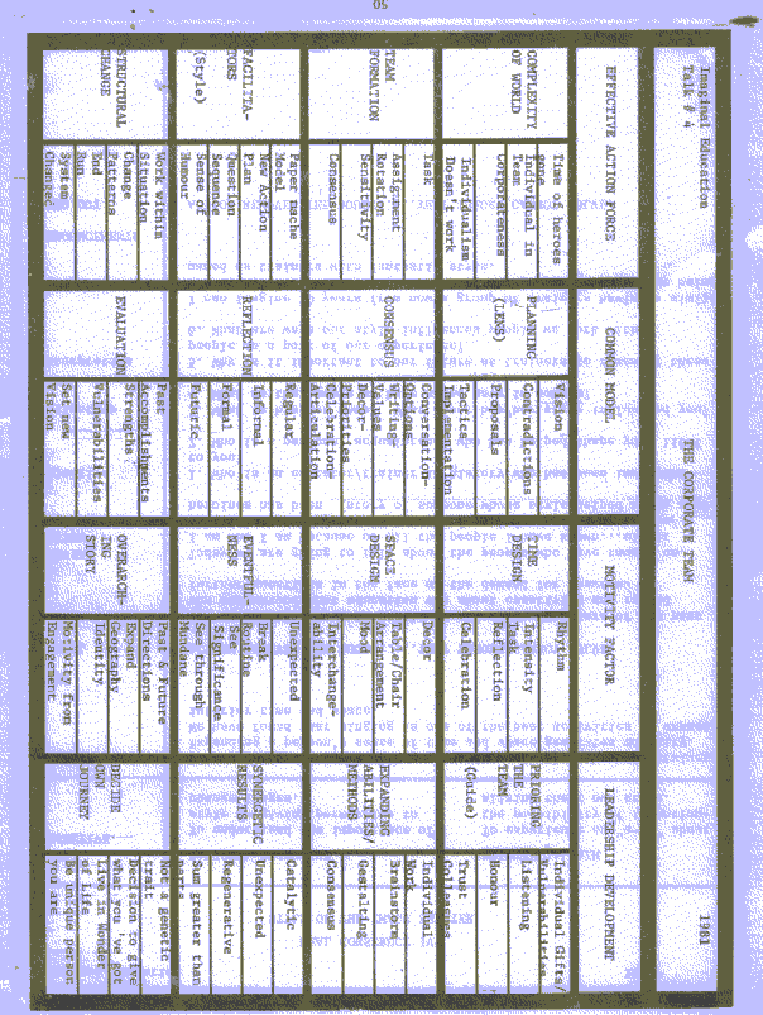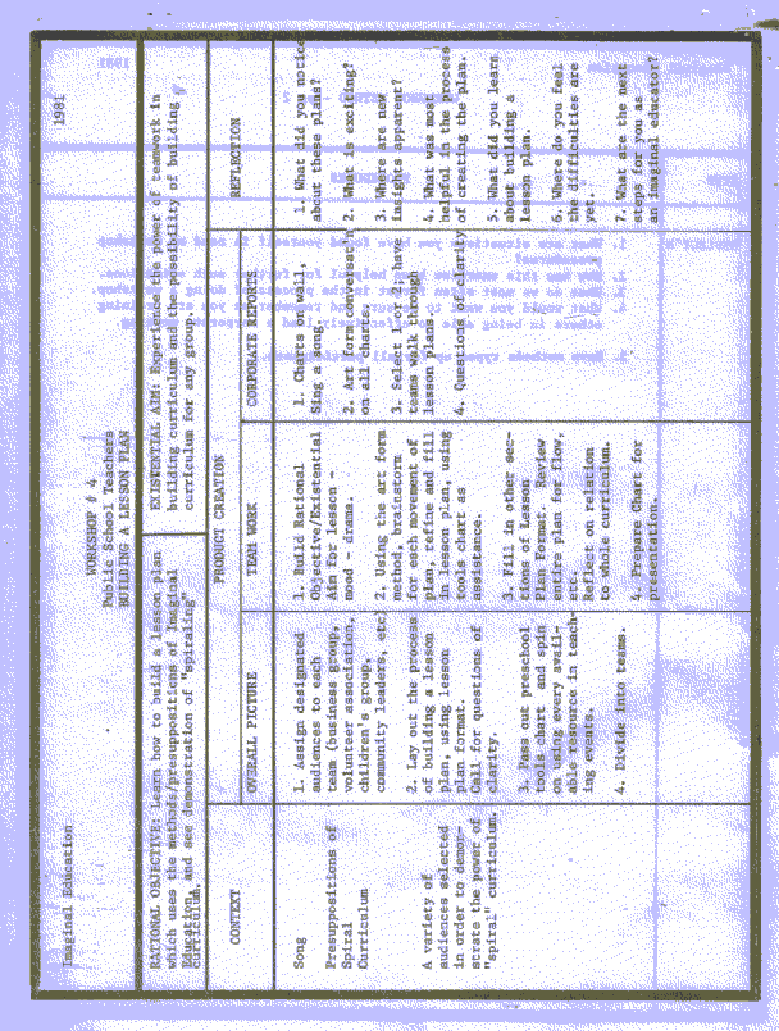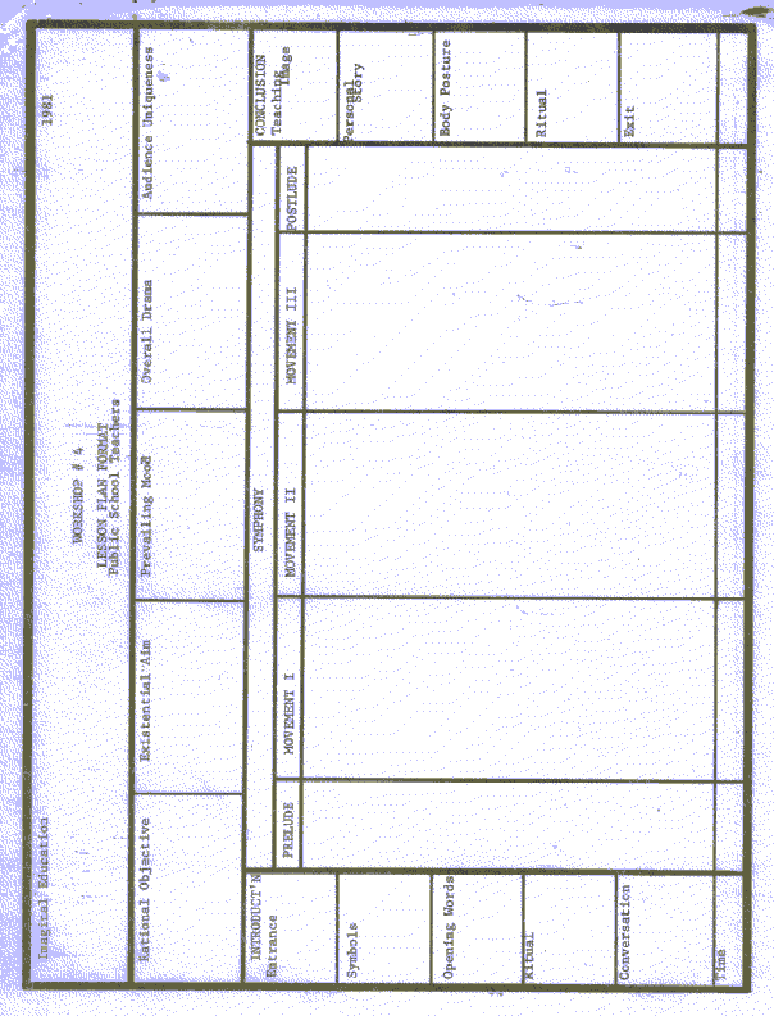

Imaginal Education 1981
:
. . .
MEAL CONSTRUCT IV
STYLE OF THE IMAGE SHIFTER
| MEAL
OBJECTIVE |
RATIONAL OBJECTIVE
To understand the importance of style in giving permission to change images |
EXISTENTIAL AIM
To experience an "a-ha" about the possibility of intentionalizing their own style |
| CONTEXT | Releasing motivation within a group is one task we have as trainers. Expanding a person's sense of time and space generates motivity. We have found that singing is one of the best activities to expand interior time and space. |
| SONGS RITUAL |
ACTION REMOVES THE DOUBT THAT THEORY CANNOT SOLVE. |
| MEAL | Let us eat this meal on behalf of the great educators of the past who understood that education was about creativity and raised further questions in the face of the demand for answers. |
| CONVER
SATION |
Today we are going to talk about the people who have taught us. I am who I am because of all the people I have known...either historically or personally. All of my life, one of my heroes/ heroines has been (story of someone whose style helped train you) |
| objective | 1. Who is an educator/trainer in history who
has been important to you?
2. Who is a personal acquaintance who has helped shape your life? |
| reflective | 3. What is his/her name? What about his/her
style influenced you?
4. What do the people we have named have in common? |
| interpretive | 5. Why is it important to our future as trainers
to remember these people as a part of our experience?
6. What are ways our style influences people we work with? I can imagine 20 years from now a group of trainers having a similar conversation and some of the names of the people in this room being named as trainers with fantastic style. |
ANNOUNCE MENTS |
|
| SEND OUT | ACTION REMOVES THE DOUBT THAT THEORY CANNOT SOLVE. |
Imaginal Education 1981
TALK SUMMARY # 4
THE CORPORATE TEAM
A. EFFECTIVE ACTION FORCE
To be effective in the complex 20th Century world, corporateness
is necessary. It is no longer desirable or possible for an individual to
work without the active input of his colleagues' minds. A team in education
can be the students and the educator or a group of educators pooling their
ability. In forming teams, it is helpful to agree on the common task after
discussion and consensus on what is necessary and what is the most helpful
way to proceed. If the content matter is set, it is still necessary for
the team to decide how it is important or learning will be blocked. The
style of the "boss" which most of us experienced is no longer
tolerated by people today. The corporate style is the style of the facilitator,
one who enables the group to learn the process rather than the expert dictionary
whotells everyone what to learn. This implies structural change in
the training set up. It involves the whole group in participating in the
training situation and if anyone disagrees, he disagrees as a part of the
group rather than as an outsider.
B. COMMON MODEL
The team operates out of a common model. This means having
a vision, finding the contradiction, proposing actions, and articulating
the steps to take. Consensus is created by having the team look at the
issues, decide the common values, and forcing alternative models from the
team until a consensus can be reached. The team structures formal and informal
ways to reflect on their plan over the year and to have a regular evaluation
period for course correction.
C. MOTIVITY FACTOR
Motivity is created by several factors. The time design
emphasizes the messages that both intensity and withdrawal is a factor
in getting a Job done. In the space design, the type of individual, social,
and public space informs everyone of the significance of the task. In the
midst of the mundane, a break into the routine creates times of eventfulness
that allows humor and a relaxed mood to be created. But unless there i8
an overreaching storythat relates their task
to a significant contribution to history, time, space, and eventfulness
will not sustain the long Journey.
D. LEADERSHIP DEVELOPMENT
To be a guide to the team involves the lookingat each member's journey: their gifts and vulnerabilities. This is first step in learning how to trust one's colleague. It is also necessary to have a plan to expand the abilities and methods of each individual in terms of their need to be self sufficient in planning. The synergetic results is that the team sees that the sum is greater than the parts. It is not enough to have most of the team working with you with only a few weak ones. Corporateness is destroyed unless everyone operates out of a common consensus and understood discipline. Finally, leadership is developed by sheer decisionon the individual's part. It is not that one person can lead and another can not all can decide to participate in the fullness of decisions that affect their own lives.
Imaginal Education 1981
READING WITH TALK # 4
THE CIRCUS OF DR. LAO APPOLONIUS AND THE
WIDOW
The widow Mrs. Howard T. Cassan came to the circus in
her flimsy brown dress and her low shoes and went direct to the fortuneteller's
tent. She paid her mite and sat down to hear of her future. Apollonius
warned her she was going to be disappointed.
"Not if you tell me the truth," said Mrs. Cassan.
"I particularly want to know how soon oil is going to be found on
that twenty acres of mine in New Mexico."
"Never," said the seer.
"Very well. What sort of man will next come into
my life?"
"There will be no more men in your life," said
the seer.
"Well, what in the world is the use of my living
then, if I'm not going to be rich, not going to be married again, not going
to know any more men?"
"I don't know," confessed the prophet. "I
only read futures. I don't evaluate them."
"Well, I paid you. Read my future."
"Tomorrow will be like today, and day after tomorrow
will be like the day before yesterday," said Appollonius. "I
see your remaining days each as quiet, tedious collections of hours. You
will not travel anywhere. You will think no new thoughts. You will experience
no new passions. Older you will become but not wiser. Stiffer but not more
dignified. Childless you are, and childless you shall remain. Of that suppleness
you once commanded in your youth, of that strange simplicity which once
attracted a few men to you, neither endures, nor shall you recapture any
of them any more. People will talk to you and visit with you out of sentiment
or pity, not because you have anything to offer them. Have you ever seen
an old cornstalk turning brown, dying, but refusing to fall over, upon
which stray birds alight now and then, hardly remarking what it is they
perch on? That is you. I cannot fathom your place in life's economy. A
living thing should either create or destroy according to its capacity
and caprice but you, you do neither. You only live on dreaming of the nice
things you would like to have happen to you but which never happen; and
you wonder vaguely why the young lives about you which you occasionally
chide for a fancied impropriety never listen to you and seem to flee at
your approach. When you die you will be buried and forgotten, and that
is all. The morticians will enclose you in a wormproof casket, thus
sealing even unto eternity the clay of your uselessness. And for all the
good or evil, creation or destruction, that your living might have accomplished,
you might just as well never have lived at all. I cannot see the purpose
in such a life. I can see in it only vulgar, shocking waste."
"I thought you said you didn't evaluate lives,"
snapped Mrs. Cassan.
"I'm not evaluating; I'm only wondering. Now you
dream of an oil well to be found on twenty acres of land you own in New
Mexico. There is no oil there. Your dream of some tall, dark, handsome
man to come wooing you. There is no man coming, dark, tall, or otherwise.
And yet you will dream on in spite of all I tell you; dream on tell you;
dream on through your little round of hours, sewing and rocking and gossiping
and dreaming; and the world spins and spins and spins. Children are born,
grow up, accomplish, sicken, and die; you sit and rock and sew and gossip
and live on. And you have a voice in the government, and enough people
voting the same way you vote could change the face of the world. There
is something terrible in that thought. But your individual opinion on any
subject in tine: world is absolutely worthless. No, I cannot fathom the
reason for your existence."
The Circus 9ff Dr. Lao Appolonius and the Widow
pg. 2
"I didn't pay you to fathom me. Just tell me my future
and let it go at that."
"I have been telling you your future! Why don't you
listen? Do you want to know how many more times you will eat lettuce or
boiled eggs? Shall I enumerate the instances you will yell good morning
to your neighbor across the fence? Must I tell you how many more times
you will buy stockings, attend church, go to moving picture shows? Shall
I make a list showing how many more gallons of water in the future you
will boil making tea, how many more combinations of cards will fall to
you at auction bridge, how often the telephone will ring in your remaining
years? Do you want to know how many more times you will scold the paper
carrier for not leaving your copy in the spot that irks you least? Must
I tell you how many more times you will become annoyed at the weather because
it rains or fails to rain according to your wishes? Shall I compute the
pounds of pennies you will save shopping at bargain centers? Do you want
to know all that? For that is your future, doing the same small futile
things you have done for the last fiftyeight years. You face a repetition
of your past, a recapitulation of the digits in the adding machine of your
days. Save only one bright numeral, perhaps: there was love of a sort in
your past; there is none in your future."
"Well, I must say, you are the strangest fortuneteller
I ever visited."
She started to say more, but there was no longer anyone
to talk to. Apollonius had vanished with that suddenness commanded by only
the most practiced magicians. Mrs. Cassan went out into the blaze of sunshine.
There she encountered Luther and Kate. It was then precisely ten minutes
before Kate's petrifaction.
"My dear," said Mrs. Cassan to Kate, "that
fortuneteller is the most magnetic man I ever met in my whole life. I am
going to see him again this evening."
"What did he say about the oil?" asked Luther.
;
"Oh, he was frightfully encouraging," said Mrs.
Cassan.
Imaginal Imaginal Education 1981
WORKSHOP # 4
WORKSHOP METHOD
| RATIONAL OBJECTIVE: To observe the role of eventfulness in planning each training | EXISTENTIAL AIM: To experience the power that eventfulness produces in a single event . |
| STEP |
PROCEDURES |
| CONTEXT | Many people when confronted with the necessity to lead a corporate meeting do not know how to plan a workshop to solve a particular issue. Each group wil1 create a workshop plan for a particular situation. Rehearse the entire workshop procedure before they break into groups. |
TEAM WORK |
Build a workshop to present to the entire group. (Each team has a particular assignment for a corporate meeting, e.g. bank tellers are going to go on strike because their lunch period is too short. You want to hold a workshop in a corporate meeting with them What will you do in that meeting.) . a. Build Context why are we doing this workshop What is the arena What is its aim b. Brainstorm Questions questions that can be answered by everyone put brainstorm lists on the board. honor all contributions responses are to be short no long speeches
or arguments. c. Gestalt of the lists arrange data into groups of related items. gestalt may reveal areas where more data is needed. gestalt will often reveal new relationships. . . d. Name the gestalt. clarifies the consensus up to this point allows group to move forward to create a model,
such as a timeline, graphic design or a chart. e. Reflection questions allows breakthroughs and insights to become clear. holds group over against the major issue of the workshop. |
| TEAM
REPORTS |
Each team lead a short workshop.
Evaluate each workshop would these procedures produce the data and insights that would solve the issue. what might you have added or done differently what will allow this workshop to be eventful for the participants. |
_
Imaginal Education 1981
WORKSHOP METHOD pg 2
.
| STEP |
PROCEDURES |
REFLECTION |
1. What are situations you have found yourself in need of
workshop procedures?
2. How has this exercise been helpful for further such situations. 3. What do we most often forget in the process of doing a workshop. 4. What would you want to be sure and remember as you are training others in being able to effectively lead a corporate meeting. 5. Have methods typed up for all participants. |


. .